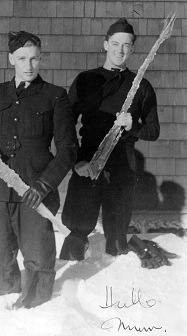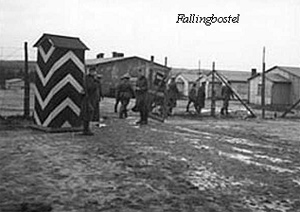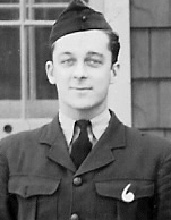|
Peter Balson |
|||||
|
|||||
| The food was a variety of traditional Dutch, presented by civilian contractor ladies who were all jolly, fat, and generous. The medical staff however were Luftwaffe and the chief surgeon declared that I had a second degree "Potts" fracture of my right foot, so into plaster it went, accompanied by a series of weights, pulleys and pins for adjustment. | |||||
| When the chief surgeon was of the opinion that it was as good as he could get it, it was replastered and I was able to walk with the aid of crutches which enabled me to attend to toiletries, showering and helping with the bedridden, the injuries of whom were many and varied, and in many cases very emotional. | |||||
|
|||||
|
Food, potatos, swededs, and an occasional issue of saurkraut, margerine, bread with potatomeal and sawdust. It was all quite acceptable and sustaining. Of course the winner was the Red Cross parcel. |
|||||
|
Somewhere
about mid 44 under Russian pressure, we were moved west to Torun, and again
after the fall of Warsaw to Fallingbostel, west of Hannover.
By that time our hosts were becoming friendly. The sky day and night was buzzing with Langs, Libs, Bits and then Mustangs and even Spitfires then Tornados as support and mopping up. Anyting that moved was promptly bombed or strafed transport was finished. Hence, no food, our ribs had started to show. The Germans thought it would be a good idea if we moved north east to avoid a possible battle
|
|
||||
|
So we moved off in a gaggle, acarrying as little as possible. The area of conflict closing. We were accompanied by a handful of whermacht. The situation was fraught with hazard, the Tornados were hunting in packs, with spitfire protecting their tail. The whole group was sitting quietly along a ditch enjoying the sunshine when the inevitable exploded. A group of six Tornados was circling around and one by one lined up on their strafing run letting their rockets go at 1500 feet andd fishtailing with cannons small bore. Right where I was sitting was most unhealthy, so in the break between No1 and No2, I scooted off across a ploughed field at right angles tot the line of fire, dropping into a furrow when the rockets let go. I was once told that of 13 aircrew posted missing, only one survivied. This must have been my lucky day. After the fireworks finished, absolute carnaga and devistation was the scene. Our guards moved us onto a large farmhouse. "Krieg ist Krieg" the farmer consoled us, we moved into his hay loft. The Krieg is finished farmer claimed. Apparently a British army column had moved in from the Netherlands |
|||||
|
|||||
|
|
|||||
|
|
|||||




